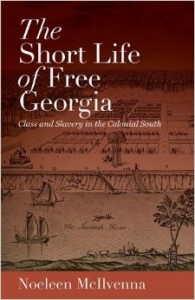Published last year, Wright State University associate professor of history, Dr. Noeleen McIlvenna’s work, The Short Life of Free Georgia: Class and Slavery in the Colonial South, 1733-1750 explores the first twenty years of Georgia’s establishment as a free labor colony. Exhaustively researched, Dr. McIlvenna examines, among other unpublished primary sources, the collected papers of Georgia Trustee, John Viscount Percival, Earl of Egmont, and James Habersham, prominent Colonial merchant. McIlvenna chose to examine the papers of these prominent men to tell not the stories of those who came to dominate Colonial Georgia but to learn about the lives of those first settlers, the “worthy” European poor the trustees recruited to populate the free colony. Because they left scant sources behind, very little is known of the poor laboring men and women who built early Georgia, but McIlvenna’s expert comparative analysis of primary sources allows for a complex picture to emerge.
Before the 1750 end of the ban on slavery, Georgia, the last of the British colonies in North America was a philanthropic experiment, a sort of noblesse oblige utopian idea dreamt up by James Oglethorpe and put into action by a select group of “Enlightened” English elites to give the masses of landless and dispossessed poor a chance at “salvation” through hard work. During the late seventeenth and early eighteenth centuries, common lands in England, traditionally worked and hunted by peasants, became the sole property of the nobility, forcing a mass diaspora of the poor into cities searching for work. Unable to find work, many were forced to live on the streets, or ended up in the notorious British workhouse system. According to McIlvenna, the British upper classes created the problem by privatizing the land, thereby dislocating a large swath of the population, but their answer, to ship a number of the dispossessed off to the new colony of Georgia would be fraught with problems from the beginning. The early settlers, having freed themselves from the yoke of British control were reluctant to follow the demands of those the British had placed in power in the new colony. The Georgia Trustees expected the same sort of British social system to evolve in early Georgia, but being so far from any centralized government led to a sort of frontier mentality. No longer satisfied with being at the bottom of the socioeconomic ladder, and willing to hold out for higher wages, McIlvenna argues, Georgia settlers developed a class consciousness.
During the Trustee Era, McIlvenna contends, class, not race defined the early politics, economics and social structure of Georgia. In the twenty years Georgia operated as a free labor economy, the South Carolina planter aristocracy would wage a political war, using race as their weapon to force slavery into Georgia, but class was the driving force during the Trustee era. The Trustees were firmly against the establishment of slavery as it was contrary to their idealized vision for the colony, which was the uplift of the poor through hard work. Slavery would undercut that whole system, and drive out working class whites. The settlers of early Georgia endured great hardships, including disease, drought, war, poor harvests, and food shortages, and the Malcontents used these “failures” as an argument for the establishment of slavery. The Trustees fought against it but ultimately with James Oglethorpe no longer invested in the colony, and Parliament unwilling to fund it, Georgia succumbed to slavery, ending the first experiment of its kind in Colonial America.
The Short Life of Free Georgia: Class and Slavery in the Colonial South is social history at its finest, and certainly the first book of its kind to point a lens at the complex political, social and economic climate that marked early free Georgia.

